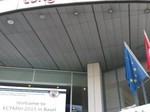Malaria rapid diagnostic tests and research consortia: Day 2 at ECTMIH 2015
9 September 2015

The role of community health workers in malaria diagnosis, the cost-effectiveness of rapid diagnostic tests and the contribution of research consortia to malaria policy were ACT Consortium highlights from the second day of the congress.
On the second day of the European Congress on Tropical Medicine and International Health (ECTMIH), ACT Consortium reseachers presented on:
Malaria rapid diagnostic tests
- Health facility caseload changes during the introduction of community case management of malaria in South Western Uganda (Sham Lal)
- Modelling the cost-effectiveness of introducing malaria rapid diagnostic tests in the private for-profit sector (David Bath)
- Referral from community health workers: evidence from cluster randomized trials of mRDTs in two areas of high and low malaria transmission in Uganda (Sham Lal)
Co-ordinated malaria research for better policy and practice: the role of research consortia
Professor David Schellenberg presented IPTi and the ACT Consortium as examples of collaborative work to improve malaria control.
Co-ordinated malaria research for better policy and practice: the role of research sonsortia from ACT Consortium
Research consortia coordinate efforts to fill evidence gaps and produce reliable, policy and practice relevant outputs.
Often they lead to new research questions: for example, malaria treatment research from the ACT Consortium has raised new questions on non-malaria causes of fever.
Professor Schellenberg provided advice to those wishing to start a research consortium:
- Include experienced principal investigators sharing a common goal and keeping sight of the goal, avoiding academic rivarly.
- Don't see a consortium simply as funding mechanism.
- Build trust-based collaborations and give credit where it's due.
- Invest in formative research.
- Build adequate time and finance for analysis and writing.
- Build in capacity strengthening activities.
- Think about communications and advocacy needs.
- Involve policy-makers in your processes, particularly in operational research.
Further information
- ECTMIH 2015: ACT Consortium joins major congress in Switzerland
- ECTMIH Day 1: Diagnostics in malaria treatment and control
- ECTMIH Day 3: Substandard and falsified medicines
- Follow us on Twitter at #ECTMIH2015 and @ACTConsortium
- Share your ideas, questions and answers on our LinkedIn group

